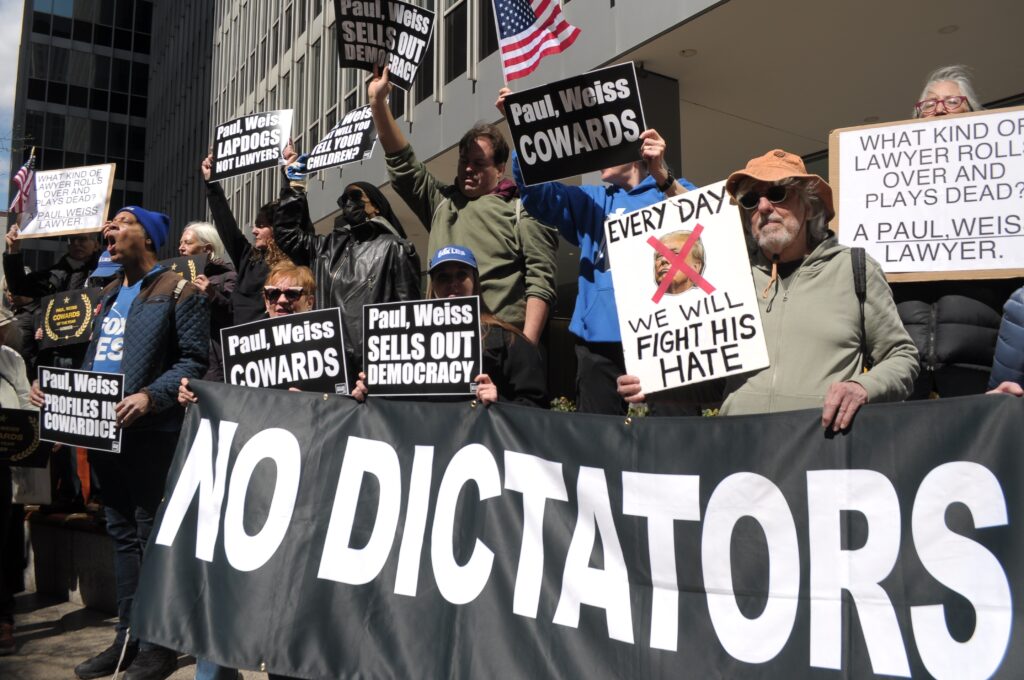Paul, Weiss Said It Felt ‘Called Upon’ to Launch a Center to Fight Hate. Now It Won’t Talk About It.

Last May, the elite law firm Paul, Weiss, Rifkind, Wharton & Garrison, held a high-profile event at its New York office to launch the Center to Combat Hate — a pro bono initiative to fight extremist hate and violence through litigation and advocacy.
“I wish the Center wasn’t necessary, but it’s a sad truth that every generation is called upon to confront hate-driven violence and intimidation, and our generation is no different,” said Dan Kramer, the Center’s board chair and a co-executive director of the Center. “In the face of all of this violence and intimidation, we all know that we cannot sit back, that we need to respond.”
In December, the Center received a prestigious award for pro bono work from the Lawyers’ Committee for Civil Rights Under Law, which cited lawsuits brought by the Center, working alongside the Lawyers’ Committee, against far-right groups.
These days, however, Paul, Weiss doesn’t seem to want to talk about the Center’s future. It’s among the starkest examples yet of how key institutions of civil society are knuckling under, rather than holding firm, in the face of President Donald Trump’s attacks — with potentially dire consequences for democratic freedoms.
On March 14, Trump issued an executive order that restricted Paul, Weiss’ ability to do business with the federal government, citing in part a pro bono lawsuit brought by one of its partners against January 6 rioters.
A week later, as part of a deal to get the order lifted, the firm admitted to “wrong-doing,” and promised to adopt “a policy of political neutrality with respect to client selection and attorney hiring,” according to the White House.
That political neutrality also appears to include soft-pedaling its work fighting right-wing extremism. Last week, the Center’s website became unresponsive, while Paul, Weiss removed from its site information about its pro bono work on topics like immigration, voting rights, LGBTQ issues and reproductive rights.
Paul, Weiss also retracted dozens of press releases, including previous statements denouncing antisemitic attacks and racism against Asians in the U.S.
On Friday, the Center’s website abruptly came back to life. That was just a day after Democracy Docket began asking Paul, Weiss about the Center’s status, and after a Huffington Post story noted the Center’s recent disappearance from the web. The information about Paul, Weiss’ other pro bono work remains gone from the firm’s site.
Paul, Weiss did not respond to Democracy Docket’s requests for comment on the Center to Combat Hate’s status. Neither Kramer nor Karen Dunn, the Center’s other co-executive director, responded to separate inquiries.
Kramer and Dunn both have prior records of successfully fighting the far right while at Paul, Weiss. Kramer helped a Black church in D.C. sue the Proud Boys over the group’s attack on the church in December 2020, while Dunn won a groundbreaking verdict against neo-Nazis responsible for the violence in Charlottesville, Virginia, in 2017.
Through the Center, Paul, Weiss has helped victims successfully sue other extremist and white supremacist groups and appears to be involved in other ongoing lawsuits.
As part of its deal with the White House, Paul, Weiss must complete $40 million-worth of pro bono legal work, the White House has said. Firm chair Bard Karp has said Trump is not dictating what free legal work Paul, Weiss does. However, the White House said the work must support “veterans, fairness in the justice system, and combating anti-Semitism; and other similar initiatives.”
The pact has been denounced throughout the legal community as likely to embolden Trump in his widening war against major law firms.
So far, Trump has issued similar executive orders or memoranda against five other major law firms who he perceives as enemies for representing political opponents or causes he doesn’t like.
At least three — Perkins Coie, Jenner & Block and WilmerHale — have sued the Trump administration, arguing the orders violate the Constitution.
Skadden, Arps, Slate, Meagher & Flom last week cut a deal with the Trump administration even though Trump hadn’t issued an order against it. As part of the deal, Skadden signed up for $100-million worth of free legal work to causes supported by the administration, Trump said.